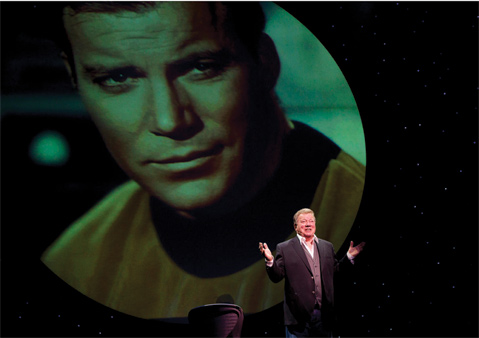The Wild World of William Shatner
The Iconic Actor Brings Shatner’s World to the Arlington

What becomes an icon most? Hard work, it turns out. Especially if the cultural signifier in question is William Shatner, reverently known around our house as The Shat but universally renowned — and yes, “icon” is the word I used — for being that Twilight Zone gremlin guy, James T. Kirk of the USS Enterprise, T.J. Hooker hanging with Heather Locklear, Denny Crane from Boston Legal, and the Priceline tout so popular he came back from the dead. When we spoke, The Shat was coming on a little like a rock star, though, to be fair he did record with Ben Folds recently.
“I’m calling from San Antone, Texas, but it’s raining,” he explained to me last week via phone. “I’d hoped to go see the Alamo, but now we’re stuck in the hotel. You know, being on tour is all about going from town to town and only seeing the theater you’re playing in.” He wasn’t complaining, exactly, since Shatner is proud of his one-man live show tour, which will fill the Arlington Theatre this Friday night. “We’re wrapping up California, then we’ll move into the winter states, and then I get to go home,” he said. “But I love doing this.”
Shatner is 81 years old, born in Canada, and came up in classical theater alongside Christopher Plummer. But Shakespeare wasn’t enough, and Shatner spent most of his life reinventing himself — besides acting, he also writes science fiction, makes documentaries, and has recorded (to admittedly mixed reception) multiple pop albums. “I do keep busy. I mean I’ve heard sad stories of other actors, people like Marlon Brando, who became disillusioned with performing. But never me,” he said. And it wasn’t Shatner family values that made him like this, either. “Oh no, they never wanted me to go into acting. But I’ve persisted mostly because it’s all I can do.”
But that’s not quite true. Before there was Kirk, he made a living doing films and early television, though Shatner claims that he mostly remembers the very small tube with a jaundiced eye. Nostalgia-free, he recalls television as more open to drama and good writing, but he doesn’t consider it a Golden Age. “Maybe some CBS executive thought of it as the burgeoning of a new art form, but for most of us poor little peons, it was just a chance to work.” He does agree that television today is comparatively more corporate and less artistic.
Star Trek was the doorway to fame back in 1966, but it didn’t exactly beam him up. There were scary lean years after 1968, when the show was cancelled and before the frothing fans brought it into syndicated glory. In his live show, Shatner remembers the time after the Enterprise was grounded when he was basically living in a pickup truck on Long Island. The resurgence of interest, coupled with the Star Wars mania, led to Trek’s extremely successful rebirth as a motion-picture enterprise. If it seemed like some guiding hand kept steering the troupe forward after the bombast of the first installment (which wags like to call Star Trek: The Motionless Picture), it succeeded on its own merits.
“It got better as the writers became more interested in telling stories,” Shatner recalled. “I think the format lent itself to good filmmaking. You know, a band of brothers out encountering adventures? The Odyssey comes to mind.” Shatner also got to take the con as a director, which suited him. “I did, I did, I did. I loved it. I only wish there had been opportunities for me to do more.”
Shatner never rested on trekkie laurels but went on to the 1980s action series T.J. Hooker, which pleased camp television lovers while it inspired others. According to Shatner, he still meets law-enforcement people who went into the blue after watching the show, and thus it helped people get into jobs that helped people, he said. But it wasn’t without problems. “I didn’t like all that running and jumping on the hot summer streets of Los Angeles when we were filming,” he said. He loved working with television producer David E. Kelley on The Practice and its spin-off Boston Legal, the demise of which Shatner attributes to studio greed.
Shatner seems uncomfortable with over-reverence. When I suggested that his ultimate culture-beatification derives from Chris Pine, who channeled him to play Kirk in J.J. Abrams’s recent Star Trek reboot, The Shat suddenly turned serious, all here and now.
“Can I give you a quick sense of what the show on Friday night is all about?” he asked, and then went on without pause. “I do a riff on a number of subjects including love, motorcycles, and comedy. It’s full of life, love, and humor, and there’s a little music in it too,” he said.
“You’ll sing?” I asked.
“I sing a little,” he admitted.
After the tour, he plans to keep boldly going forth. He’s doing more documentaries. He’s connected to the development of a new phone app, and he’s pitching a reality series to studios. He’s also an avid horseman (he recently showed and won a championship prize at Earl Warren.) He’ll write; he’ll sing.
“I keep busy,” he said.
4•1•1
UCSB’s Arts & Lectures presents William Shatner in Shatner’s World this Friday, January 18, at the Arlington Theatre (1317 State St.) at 8 p.m. For tickets and info, call (805) 893-3535 or visit artsandlectures.sa.ucsb.edu.



